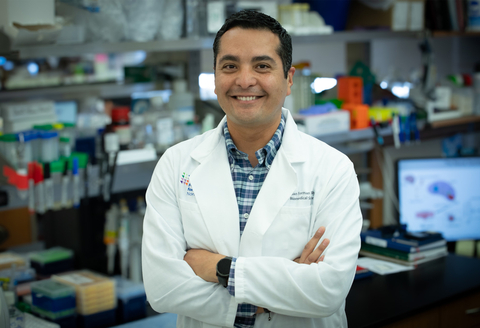MANHASSET, N.Y.– A wunderkind is someone who succeeds in a competitive or highly difficult field or profession at an early age. In recognition of their great scientific achievements, The Feinstein Institutes for Medical Research’s Carlos E. Bravo-Iñiguez, MD, PhD, has been named a 2024 STAT Wunderkind. According to STAT, this esteemed recognition celebrates the brightest young minds in life sciences research who are pushing the boundaries of scientific innovation.
Dr. Bravo-Iñiguez is being honored for his groundbreaking research in the field of bioelectronic medicine, which harnesses the power of the body’s nervous system with technology to treat disease. His innovative research approach focuses on using vagus nerve stimulation (VNS) to address hemorrhage and hemophilia, a bleeding disorder that poses a serious risk of mortality. Under the guidance of Jared Huston, MD, associate professor in the Institute of Bioelectronic Medicine at the Feinstein Institutes, Dr. Bravo-Iñiguez’s 2023 publication in Nature Communications demonstrated a significant reduction in bleeding severity using this novel strategy in preclinical models. This discovery has the potential to revolutionize treatment, offering patients a more effective approach to curtailing hemorrhage.
“It is a bit surreal to be named a STAT Wunderkind among so many other talented doctors and scientists,” said Dr. Bravo-Iñiguez. “I am thankful for all the support I´ve received at the Feinstein Institutes, especially from Dr. Huston and every mentor who has guided me along this journey. This recognition fuels my passion to keep pushing the boundaries of bioelectronic medicine to develop new and more effective treatments for patients in need.”
Each year, STAT evaluates hundreds of nominations from North America in search of the next generation of scientific stars. The news organization looks to spotlight impressive doctors and researchers on the cusp of launching their careers.
“We are proud of Dr. Bravo-Iñiguez for this well-deserved recognition,” said Kevin J. Tracey, MD, president and CEO of the Feinstein Institutes and the Karches Family Distinguished Chair in Medical Research at Northwell Health. “His devotion to researching bioelectronic medicine embodies the Feinstein Institutes’ commitment to producing knowledge to cure disease.”
A dedicated physician-scientist, Dr. Bravo-Iñiguez earned his MD at the Universidad Nacional Autónoma de México before graduating in 2023 from the Elmezzi Graduate School of Molecular Medicine, a specialized PhD program at the Feinstein Institutes designed for physicians with a unique blend of clinical and research expertise. His research focuses on integrating cutting-edge technologies and novel therapies into patient care. By leveraging advanced neuromodulatory techniques like VNS and non-invasive peripheral focused ultrasound (pFUS), Dr. Bravo-Iñiguez is pioneering new ways to influence and regulate nerve activity, unlock the body’s healing potential, and develop transformative treatments to improve health outcomes for patients with bleeding disorders.
“Dr. Bravo-Iñiguez embodies leadership and determination. His passion for innovation, coupled with an unwavering commitment to advancing science to cure disease, serves as inspiration to colleagues and peers,” said Dr. Huston. “His work with vagus nerve stimulation and bioelectronic medicine to reduce bleeding has the potential to dramatically improve patient outcomes and save many lives.”
Excessive bleeding poses a serious risk of mortality. It affects a wide range of individuals, including birthing mothers, victims of motor vehicle collisions, soldiers on the battlefield, and those with hemophilia and other inherited or acquired bleeding conditions. There is an urgent, unmet demand for novel treatments, including non-pharmacological and rapid-acting therapies. Through harnessing the protective effects of the vagus nerve, Drs. Bravo-Iñiguez and Huston aim to develop a “neural tourniquet,” a non-invasive method for controlling bleeding with game-changing benefits to patients undergoing surgical procedures or trauma care.
The Feinstein Institutes for Medical Research is the global scientific leader in bioelectronic medicine and vagus nerve stimulation, where medical researchers use modern technology to develop new device-based therapies to treat disease and injury. Built on decades of research, the field of bioelectronic medicine integrates insights from neuroscience, molecular medicine, and biomedical engineering, and researchers at the Feinstein Institutes leverage the connection between the brain and the immune system to develop bioelectronic medicine interventions.
The discovery that initiated the field of bioelectronic medicine – called the “inflammatory reflex” – was made more than twenty years ago by Dr. Tracey. This discovery emerged from studies on vagus nerve signaling and showed that the brain and body communicate to regulate inflammation and, if uncontrolled, inflammation could lead to disease. Today, engineers, computer scientists, immunologists, neuroscientists, and clinicians develop cutting-edge medicine, including neuroimmune modulation, miniature implants for stimulating and recording the vagus nerve, noninvasive ultrasound neuromodulation to suppress inflammation, and novel brain-computer interfaces to overcome injuries of the nervous system. These collaborative efforts converge to create personalized, precise treatments that hold promise in treating acute and chronic diseases, often with fewer side effects compared to current therapies. These treatments have the potential to enhance or replace existing treatments across a range of conditions such as arthritis, heart disease, inflammatory bowel diseases, diabetes, cancer, and autoimmune disorders. By producing bioelectronic medicine knowledge, disease and injury could one day be treated by our own nerves without costly and potentially harmful pharmaceuticals.


